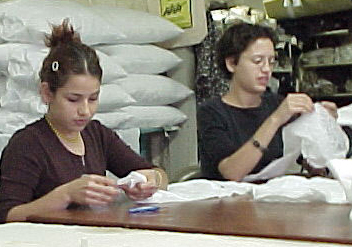
Serrano puts her sewing
techniques and patience to the test at the Fuerza Unida Center, located
off New Laredo Highway.The center focuses on community service projects
like food drives and rallies and tries to motivate minority women, especially
housewives, to come out of their shell and become independent.
"We are sewing the pillows for a local hotel to make money to pay
the bills to keep us going here, and for other events that we have, like
food drives and special sewing classes we would like to offer to the community,"
said Serrano, a sophomore Elementary Education major.
"I really love it here. Even when I don’t have to come, I still
come for a while. When the semester is over, I still plan to come and
lend my helping hand," Serrano said.
In August of 2000, the Alamo Community College District received a grant
from the Corporation for National Service to help institutionalize Service-Learning
in the District’s four colleges. Service-Learning should not be confused
with volunteerism or an internship. According to the National Community
Trust Act of 1993, Service Learning is a method whereby students learn
and develop through active participation in thoughtfully organized service
that is conducted in and meets the needs of communities...and provides
structured time for students or participants to reflect on the service
experience.
Students are encouraged
to join agencies that are associated with arts, children and youth, education
and mentoring, AIDS, disabilities, health care, legal issues, domestic
violence, hunger, homelessness or poverty.
"The students are encouraged by faculty to go into a community agency
to offer a service," said Lillian Huerta, Service-Learning Coordinator.
"In return, they not only learn but they develop the ability to think
critically."
Before getting started with the program, students must find out if the
classes they are taking offer a Service-Learning component. Then, they
must submit an enrollment form. After that, they may choose a designated
area or the instructor may select a certain area that ties into the class
they are taking. The student must fulfill all course requirements, meet
the required service hours and attend reflection sessions, which are held
twice each semester. Required hours vary with each faculty member. Students
are encouraged to exceed the minimum.
Joseph Sanchez, a sophomore Psychology major, is currently serving as
a tutor at Ayers House and Project Learn To Read. Ayers House is a place
where juvenile offenders live. He will accumulate 70 hours of service
by the end of the semester.
"I try to help out with tutoring for G.E.D classes at the Ayers House.
I break down the homework by trying to do it in sessions. Sometimes I
tutor a whole group, or one on one," said Sanchez. "At Project
Learn to Read, I teach grammar skills," added Sanchez.
Reflection Sessions are a key part of the experience. Sessions are held
twice each semester to give faculty and the coordinator an idea of what
is going on and what is being learned. Faculty member Steve Mardock held
a session in his Criminal Justice class, which sparked a bit of emotion
for some students who offer their service at the Ayers House.
"I was very self-motivated when I was there. I came from a bad neighborhood,
but I managed to suppress all of that. I wanted to show these guys that
they can do that as well," said Aaron Alvarado, a freshman Criminal
Justice major.
At the end of the semester when requirements are met, students are awarded
T-shirts and certificates. Some are even offered permanent positions at
the site depending on the dedication and motivation they showed. The majority
of the participants come out with the satisfaction and fulfillment of
their service.
"We try to reward students at the end of the program, not based on
how many hours they gave, but based on what they learned from the experience,
which is something that will be carried with them forever," Huerta
said.
For more information about Service-Learning, contact Lillian Huerta (lhuerta@accd.edu) at (210)-921-5126 or or visit the website at www.accd.edu/pac/studact/LSwelcome.htm